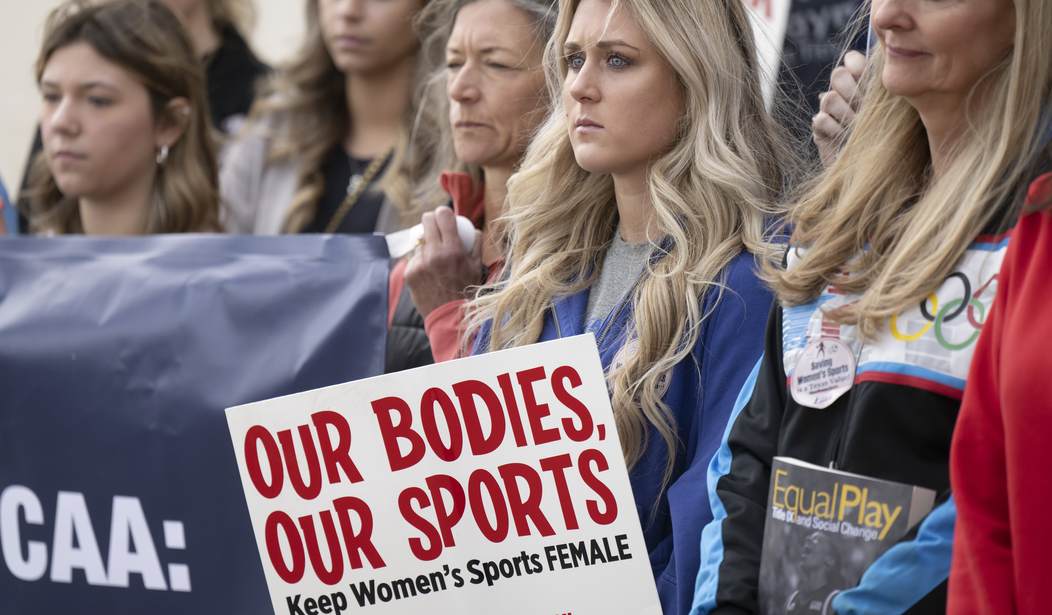On Thursday, a group of women athletes filed a class-action lawsuit in the U.S. District Court in Georgia, claiming that the NCAA and Georgia Tech are violating Title IX by allowing men to compete on women's sports teams.
At the center of the class-action lawsuit is Lia Thomas, the trans athlete who dominated the 2022 NCAA Swimming Championships while a student at the University of Pennsylvania. The suit states that both the NCAA and Georgia Tech, which hosted the event, knowingly violated Title IX, the federal statute that guarantees equal opportunity for men and women in college education and sports.
The lawsuit, the first federal action of its kind, seeks to change the rules, rendering any biological males ineligible to compete against female athletes. It demands the NCAA revoke all awards given to trans athletes in women’s competitions and “reassign” them to their female contenders. It also asks for “damages for pain and suffering, mental and emotional distress, suffering and anxiety, expense costs and other damages due to defendants’ wrongful conduct.”
Swimmer Riley Gaines is one of the key figures in the suit.
🚨it's official!🚨
— Riley Gaines (@Riley_Gaines_) March 14, 2024
I'm suing the NCAA along with 15 other collegiate athletes who have lost out on titles, records, & roster spots to men posing as women
The NCAA continues to explicitly violate the federal civil rights law of Title IX. About time someone did something about…
The timing of the suit is interesting, coming as it does at a time when the Biden Administration is devoting government resources - that is to way, taxpayer dollars - to push "gender ideology," which may be added to the long, long list of things the federal government has absolutely no authority under the Constitution to do.
See Related: Priorities: Biden Budget Proposal Includes Billions to Push Gender, Sexuality, and Race Ideology
The Number of Americans Identifying As LGBT Is Absolutely Surging
At the heart of the lawsuit is the "transgender" athlete Lia Thomas. Thomas, after "transitioning," competed in the 2022 NCAA national women's swimming competition, winning the 500-yard freestyle and winning the "All-American" title in all three events he competed in. This came after Thomas, before "transitioning," turned in a lackluster performance on the men's teams in 2017-2020.
Thomas also insisted on and was allowed to use the women's locker room. The class-action suit addresses that issue as well.
Thomas’s switch to the team also meant a switch in the locker room. The lawsuit accuses the NCAA of “destroying female safe spaces in women’s locker rooms,” in a violation of the Fourteenth Amendment. It claims the association allows “naked men possessing full male genitalia to disrobe in front of non-consenting college women” and creates “situations in which unwilling female college athletes unwittingly or reluctantly exposed their unclad bodies to males, subjecting women to a loss of their constitutional right to bodily privacy.”
The FreePress's Francesca Block interviewed Riley Gaines and Réka György, two of the key figures in the suit:
On Thursday, I reported on the NCAA's President, Charlie Baker, tacitly admitting that the NCAA has done no research into the relative strengths of men and women athletes; while I'm not a lawyer, this would not seem to augur well for the NCAA in this suit. An organization that adopted a controversial policy without even arsing themselves to understand the consequences of that policy would appear to present low-hanging fruit for the members of the class-action suit.
This lawsuit has the potential to completely upend the grossly unfair practice of allowing men - like Lia Thomas - to compete on women's sports teams. It also will address the dangerous practice of allowing men into women's locker rooms, and if there is any sanity remaining in the world, success for the plaintiffs, in this case, will be leveraged into success in returning some sanity to women's sports outside the NCAA.














